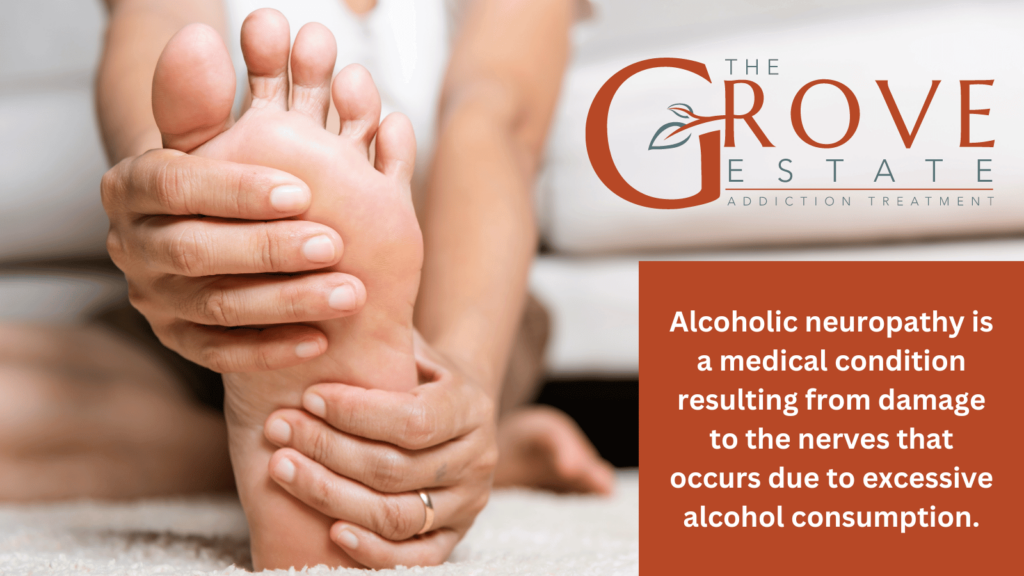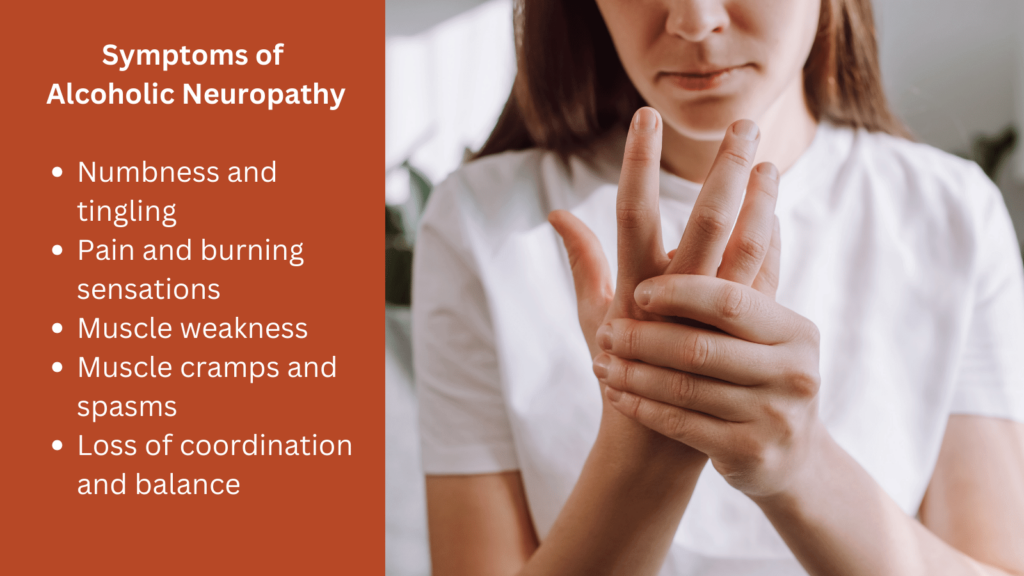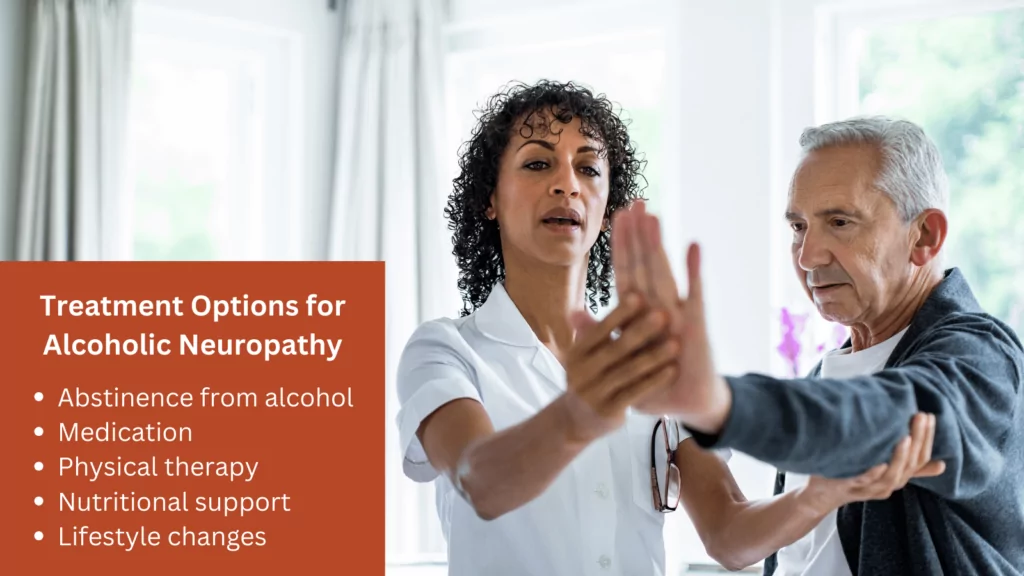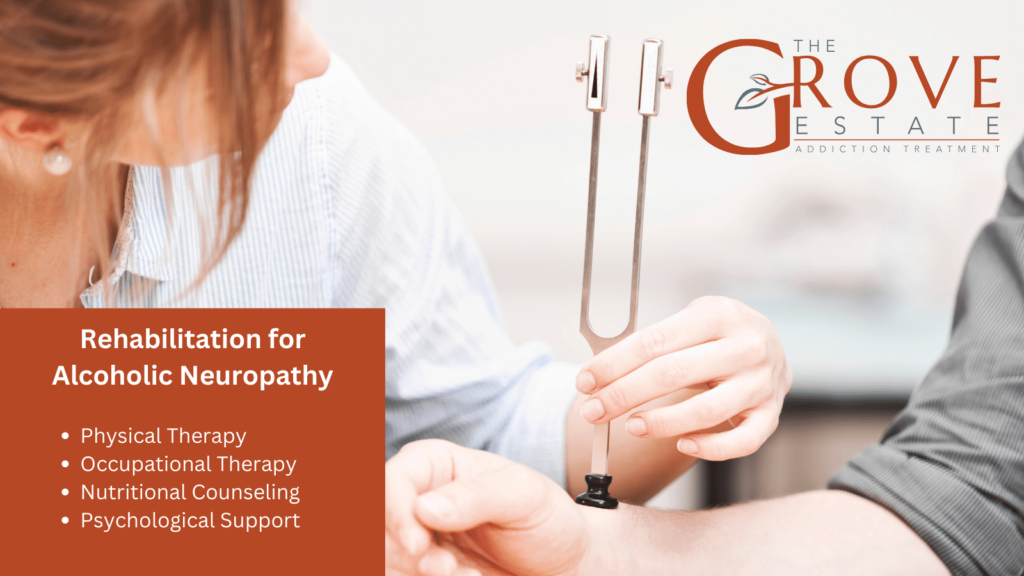Alcoholism can lead to alcoholic neuropathy, a type of nerve damage that causes pain, tingling, and weakness, predominantly in the hands and feet. According to the National Institute on Alcohol Abuse and Alcoholism, up to 50% of long-term heavy alcohol users develop some form of neuropathy.
While some effects of alcoholic neuropathy can be irreversible, early diagnosis and intervention can significantly improve the prognosis. Treatment typically involves cessation of alcohol use, nutritional support, and management of symptoms, suggesting that while complete cure may not be possible for all, substantial recovery and symptom relief are achievable for many.

What Is Alcoholic Neuropathy?
Alcoholic neuropathy is a medical condition resulting from damage to the nerves that occurs due to excessive alcohol consumption. It manifests through various symptoms such as numbness, tingling, burning sensations, muscle weakness, and even changes in bodily functions. The condition develops because alcohol has a toxic effect on nerve tissue, and chronic abuse can lead to poor nutrition, further exacerbating nerve damage.
The link between alcohol use and nerve damage is primarily due to the direct toxic effects of alcohol on nerve cells, coupled with nutritional deficiencies common in heavy drinkers. Alcohol interferes with the absorption and metabolism of essential nutrients that are vital for nerve health, such as vitamin B12, thiamine, and folate. Over time, the cumulative effect of these deficiencies and the toxic impact of alcohol can lead to the development of alcoholic neuropathy.
Can Alcoholic Neuropathy Be Cured?
Alcoholic neuropathy can improve with abstinence from alcohol and appropriate medical treatment. Alcoholic neuropathy presents a complex challenge in terms of treatment and recovery, with the extent of nerve damage and the timing of intervention playing crucial roles in determining the outcome. Although a complete cure may not be feasible in all cases, certain measures can significantly enhance the prospects of recovery and improve quality of life. Here is a list of factors that are pivotal in addressing alcoholic neuropathy:
- Early cessation of alcohol use to prevent further nerve damage.
- Nutritional supplementation to correct deficiencies, particularly of B vitamins.
- Medical management of symptoms to alleviate pain and discomfort.
- Physical therapy to strengthen muscles and improve coordination.
- Regular monitoring and assessment to adjust treatment plans as needed.
- Psychological support to address underlying issues related to alcohol abuse.

What are the Symptoms of Alcoholic Neuropathy?
Alcoholic neuropathy is characterized by a range of symptoms that result from nerve damage due to excessive alcohol consumption. Common signs and symptoms include:
- Numbness and tingling: Often described as a “pins and needles” sensation, particularly in the extremities like hands and feet.
- Pain and burning sensations: Can vary from mild to severe, often affecting the legs and arms.
- Muscle weakness: Leads to difficulties in walking or handling objects, due to weakened muscles in the affected areas.
- Muscle cramps and spasms: Sudden, involuntary muscle contractions that can be painful.
- Loss of coordination and balance: Affects mobility and increases the risk of falls.
These symptoms manifest differently in various parts of the body, depending on the nerves affected. For example:
- In the feet and legs: Symptoms might include pain, numbness, and a burning sensation, leading to difficulty walking or standing.
- In the hands and arms: Manifestations can include loss of fine motor skills, making tasks like buttoning a shirt or writing challenging.
- In the autonomic nerves: Can lead to issues with internal organ functions, such as gastrointestinal disturbances, changes in blood pressure, and bladder control problems.
The severity and combination of symptoms can vary widely among individuals, depending on the extent of nerve damage and the duration of alcohol abuse.
What are the Causes of Alcoholic Neuropathy?
Alcoholic neuropathy arises from a combination of factors related to chronic alcohol consumption. The key mechanisms leading to nerve damage include:
- Alcohol toxicity: Ethanol, the active ingredient in alcoholic beverages, is a neurotoxin that can directly damage nerve cells over time. Chronic exposure to alcohol interferes with the normal functioning of neurons, leading to neuropathy.
- Nutritional deficiencies: Heavy alcohol use often results in poor nutrition and absorption of essential nutrients, particularly the B vitamins (such as B1, B6, and B12), which are crucial for nerve health and function. Deficiencies in these vitamins can directly contribute to nerve damage.
- Metabolic disturbances: Alcohol affects the metabolism of various substances in the body, which can lead to toxic metabolites that also damage nerve tissues.
- Oxidative stress: Chronic alcohol consumption can lead to oxidative stress, where an excess of free radicals damages cellular components, including nerves.
These factors combined or individually contribute to the degeneration of nerve fibers, leading to the symptoms and complications associated with alcoholic neuropathy. The relationship between alcohol toxicity and nutritional deficiencies is particularly significant because alcohol not only directly harms nerve tissue but also impairs the body’s ability to absorb and utilize the nutrients needed for nerve repair and maintenance.
How to Diagnose Alcoholic Neuropathy?
Diagnosing alcoholic neuropathy involves a clinical evaluation, patient history, and sometimes additional tests. Doctors assess symptoms, drinking history, and perform neurological examinations to check for nerve damage. Accurate diagnosis is crucial for appropriate treatment, aiming to manage symptoms and prevent further nerve damage. Additional tests like nerve conduction studies, blood tests for vitamin deficiencies, and imaging may be used to confirm the diagnosis and rule out other conditions.

What are Treatment Options for Alcoholic Neuropathy?
Treatment for alcoholic neuropathy involves a combination of medical, therapeutic, and lifestyle approaches:
- Abstinence from alcohol: Essential to halt the progression of nerve damage.
- Medication: Pain relief through over-the-counter or prescription medications, and supplements to address nutritional deficiencies, particularly B vitamins.
- Physical therapy: To improve muscle strength, coordination, and mobility.
- Nutritional support: A diet rich in vitamins and nutrients to support nerve health and overall well-being.
- Lifestyle changes: Regular exercise and smoking cessation to enhance blood flow and nerve health.
Effective management of alcoholic neuropathy requires a holistic approach that addresses the underlying cause of the neuropathy, alleviates symptoms, and supports overall health and recovery.
How Long Does Alcoholic Neuropathy Take to Improve?
The improvement timeline for alcoholic neuropathy can vary widely among individuals. Some may experience symptom relief within a few weeks of abstaining from alcohol and receiving treatment, while for others, it may take several months to notice significant improvement. The variability in recovery rates depends on factors like the severity and duration of alcohol abuse, the extent of nerve damage, and the individual’s overall health and compliance with treatment.
While some symptoms may improve relatively quickly with proper treatment and lifestyle changes, other symptoms, especially in cases of severe or long-term neuropathy, may only partially recover or may be permanent. Consistent follow-up with healthcare providers, ongoing therapy, and sustained lifestyle changes are crucial for maximizing the potential for recovery and improving quality of life.

What is The Role of Rehabilitation in Alcoholic Neuropathy?
Rehabilitation plays a critical role in the treatment of alcoholic neuropathy, focusing on both physical and psychological aspects to facilitate recovery and improve quality of life. The rehabilitation process includes:
- Physical Therapy: Helps restore function, improve mobility, reduce pain, and increase muscle strength and coordination, which are often compromised in alcoholic neuropathy.
- Occupational Therapy: Aims to improve the ability to perform daily activities and maintain independence by teaching adaptive techniques and using assistive devices if necessary.
- Nutritional Counseling: Addresses dietary needs to ensure adequate intake of essential nutrients that support nerve repair and overall health.
- Psychological Support: Counseling and therapy to address the underlying issues related to alcohol abuse, helping individuals develop coping strategies and maintain sobriety.
What is the long-term outlook for someone with alcoholic neuropathy?
The prognosis varies; some individuals may experience significant improvement, while others may have persistent symptoms, depending on the extent of nerve damage and the effectiveness of the treatment and lifestyle changes.
Are there any specific medications used to treat alcoholic neuropathy?
Medications may include pain relievers, anti-seizure medications for neuropathic pain, and supplements to correct nutritional deficiencies.
Can exercise improve symptoms of alcoholic neuropathy?
Yes, exercise can improve blood flow, enhance muscle strength, and reduce neuropathy symptoms.
How does alcohol withdrawal affect neuropathy?
Withdrawal can initially exacerbate symptoms, but continued abstinence from alcohol is key to preventing further nerve damage.
Can lifestyle changes reverse damage caused by alcoholic neuropathy?
While some damage caused by alcoholic neuropathy may be irreversible, especially in advanced cases, lifestyle changes can significantly improve symptoms and, in some instances, reverse the damage to some extent. Early intervention and changes such as abstaining from alcohol, improving dietary habits to address nutritional deficiencies, engaging in regular exercise and nutrition programs, and quitting smoking can all contribute to nerve health and recovery. These changes can help improve blood flow to the nerves, enhance the body’s ability to repair damaged nerve tissues, and reduce the risk of further nerve damage.
Implementing these lifestyle changes can also mitigate other symptoms of alcohol abuse, such as alcoholics shakes, by addressing the root causes of the disorder and supporting the body’s recovery from the effects of chronic alcohol consumption. Comprehensive treatment approaches that incorporate these lifestyle modifications alongside medical interventions offer the best chance for individuals with alcoholic neuropathy to improve their quality of life and reduce the severity of their symptoms.

Share This Post



